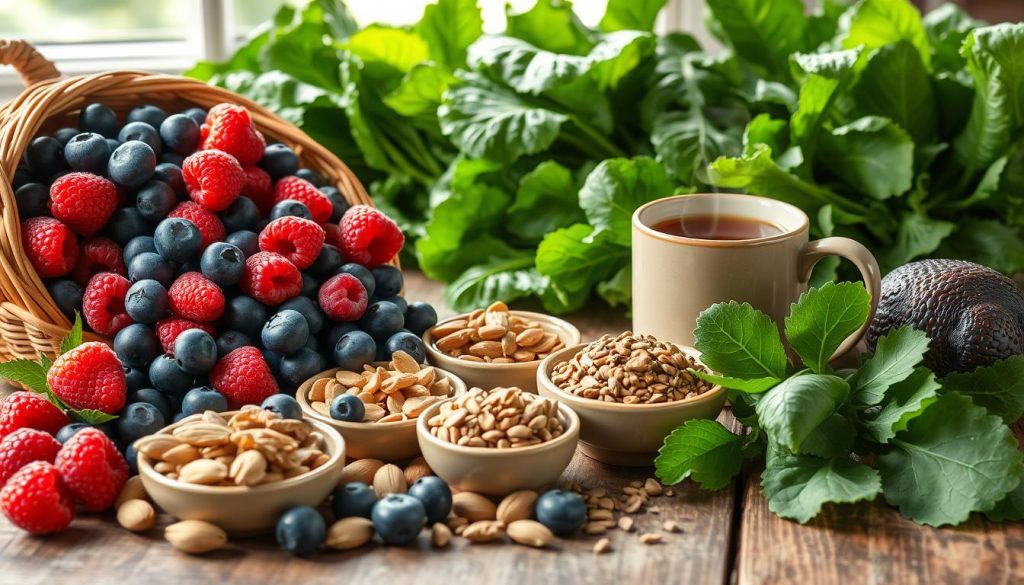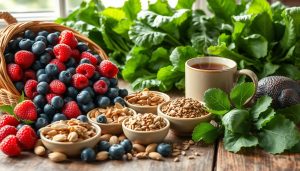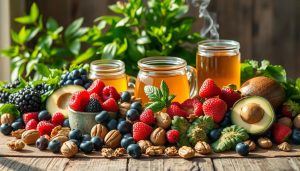As we get older, keeping our cognitive health sharp is key. Eating foods rich in important nutrients can really help our brains and overall health, more so for seniors.
What if some foods could make our brains work better and even slow down memory loss? Studies show that eating certain foods can really help our brain function.
Good nutrition is essential for brain health. By choosing the right foods, seniors can help keep their minds sharp.
Key Takeaways
- Adding specific foods to your diet can help your brain health.
- Nutrition is key for keeping brain power in seniors.
- Eating well can help slow down memory loss.
- Some nutrients are great for brain function.
- Seniors can take steps to keep their brains healthy through diet.
The Aging Brain: Why Nutrition Matters
As people get older, their brains change a lot. These changes can affect how well they think and feel. Eating the right foods is key to keeping the brain healthy.
How Cognitive Function Changes After 60
After 60, many people start to notice their brains aren’t as sharp. They might forget things more easily or think slower. Nutritional interventions can help a lot during this time.
The Brain-Diet Connection
What we eat really matters for our brain health. Some foods can help our brains work better. Foods full of antioxidants, omega-3 fatty acids, and other essential nutrients are great choices.
“The food we eat has a profound impact on our brain health, and making informed dietary choices can significantly influence our cognitive well-being as we age.”
Nutritional Needs for Seniors
Seniors need special nutrients to keep their brains healthy. Foods rich in vitamin D, calcium, and fiber are important. Here’s a table showing some key nutrients and where to find them:
| Nutrient | Food Sources |
|---|---|
| Omega-3 Fatty Acids | Salmon, Walnuts, Chia Seeds |
| Antioxidants | Blueberries, Spinach, Dark Chocolate |
| Vitamin D | Fatty Fish, Fortified Dairy Products, Sunlight Exposure |
It’s important for seniors to get enough of these nutrients. This helps keep their brains in good shape.
6 Foods People over 60 Should Eat More Of for Better Cognitive Function
Eating the right foods can help seniors keep their minds sharp. As we get older, our brains change, which can affect how we think. But, eating foods that are good for the brain can help keep our minds healthy.
The Science Behind Food and Brain Health
Studies show that some nutrients in food are good for the brain. Omega-3 fatty acids, antioxidants, and anti-inflammatory compounds are key. They help by reducing inflammation, keeping brain cells healthy, and helping new neurons grow.
How These Foods Were Selected
The six foods we picked are full of nutrients that are good for the brain. They have been studied a lot for their brain benefits. This shows they are important for keeping the brain healthy.
The Role of Antioxidants and Anti-inflammatories
Antioxidants and anti-inflammatory compounds are vital for brain health. Berries, leafy greens, and other fruits and vegetables are full of these. They protect the brain from damage caused by stress and inflammation.
| Food | Key Nutrient | Cognitive Benefit |
|---|---|---|
| Fatty Fish | Omega-3 fatty acids | Supports brain cell structure and function |
| Berries | Antioxidants | Reduces oxidative stress and inflammation |
| Leafy Greens | Folate, Vitamin K | Supports cognitive health and memory |
By eating these foods, seniors can help keep their brains healthy. This can help them stay sharp and maintain their cognitive abilities.
Fatty Fish: The Omega-3 Champions for Brain Health
Eating fatty fish can greatly improve brain health. They are full of omega-3s, which are great for the brain. As we get older, eating foods rich in these nutrients is key for brain health.
Nutritional Profile of Salmon, Mackerel, and Sardines
Fatty fish like salmon, mackerel, and sardines are tasty and nutritious. They are loaded with omega-3s, which are vital for brain function. These fish also have protein, vitamin D, and selenium, making them good for the brain.
| Fish Type | Omega-3 Content | Protein Content |
|---|---|---|
| Salmon | 1.8g per 3 oz serving | 20g per 3 oz serving |
| Mackerel | 2.5g per 3 oz serving | 18g per 3 oz serving |
| Sardines | 1.3g per 3 oz serving | 25g per 3 oz serving |
How Omega-3s Support Brain Cell Structure and Function
Omega-3s are vital for brain health. They help keep brain cells working well. Studies show they can help with thinking and may lower the risk of brain decline.
“Omega-3 fatty acids are essential for brain function and development. They have been shown to support cognitive health and may reduce the risk of dementia.”
Nutrition and Cognitive Health Expert
Delicious Ways to Include More Fish in Your Weekly Menu
It’s easy to add more fatty fish to your meals. Try salmon in salads, mackerel on the grill, or sardines in pasta. Seniors should eat fatty fish at least twice a week for brain benefits.
- Grilled salmon with a citrus marinade
- Mackerel salad with mixed greens and a light vinaigrette
- Sardine pâté on whole-grain crackers
By eating fatty fish regularly, you support your brain health. They offer great taste and texture. Whether you want better mental clarity or just want to stay healthy, fatty fish are a great choice.
Colorful Berries: Nature’s Memory-Enhancing Fruits
Berries are not just tasty; they’re also good for your brain. They’re full of antioxidants, vitamins, and minerals. Eating berries can help keep your mind sharp and may even slow down memory loss as you age.
The Cognitive Benefits of Blueberries, Strawberries, and Blackberries
Blueberries, strawberries, and blackberries are great for your brain. Blueberries are known as a “brain food” because they boost memory and thinking skills. Strawberries are full of vitamin C and antioxidants, which are good for your brain. Blackberries have fiber, vitamins, and minerals that help your overall health, including your brain.
A study in the Journal of Agricultural and Food Chemistry found that eating berries can improve memory and thinking in older adults. The antioxidants and anti-inflammatory compounds in berries are key to these benefits.
Anthocyanins and Their Role in Reducing Brain Inflammation
Anthocyanins, the antioxidants that make berries red, purple, and blue, fight brain inflammation. Chronic inflammation can harm your brain and increase the risk of diseases. Eating berries can help reduce this risk.
“The anthocyanins in berries not only give them their vibrant colors but also provide significant anti-inflammatory benefits that can protect the brain.”
Simple Berry Recipes and Storage Tips for Seniors
Adding berries to your diet is easy and fun. Here are some ideas:
- Add fresh or frozen berries to your oatmeal or yogurt.
- Blend berries into a smoothie with your favorite milk or yogurt.
- Use berries as a topping for salads or desserts.
To keep berries fresh, store them in a cool, dry place. Wash them just before using. Frozen berries are also nutritious and can be just as good as fresh ones.
| Berry Type | Key Nutrients | Cognitive Benefits |
|---|---|---|
| Blueberries | Anthocyanins, Vitamin C | Improved Memory, Cognitive Function |
| Strawberries | Vitamin C, Antioxidants | Better Brain Health, Anti-inflammatory Effects |
| Blackberries | Fiber, Vitamins, Minerals | Supports Overall Health, Brain Health |
Leafy Greens: Vitamin Powerhouses for Mental Clarity
Leafy greens are full of vitamins and minerals that help the brain. They are packed with nutrients that support brain health. These foods are essential for seniors to keep their minds sharp.
Why Kale, Spinach, and Collards Are Essential for Brain Function
Kale, spinach, and collard greens are great for the brain. They have vitamins A, C, and K, and minerals like calcium and iron. Adding these greens to your meals can boost brain function and lower the risk of memory loss.
The Role of Vitamin K, Folate, and Lutein in Cognitive Health
Vitamin K, Folate, and Lutein are important for brain health. Vitamin K helps make fats in brain cells. Folate is key for making neurotransmitters. Lutein fights off brain damage. These nutrients help keep the brain healthy and sharp.
Creative Ways to Incorporate More Greens (Even If You Don’t Like Them)
It’s easy to add leafy greens to your meals. Try spinach in smoothies, kale with garlic, or collard greens in soups. If you don’t like the taste, mix greens into omelets or pasta sauces. Try new recipes to enjoy more leafy greens.
Nuts and Seeds: Small Packages with Big Brain Benefits
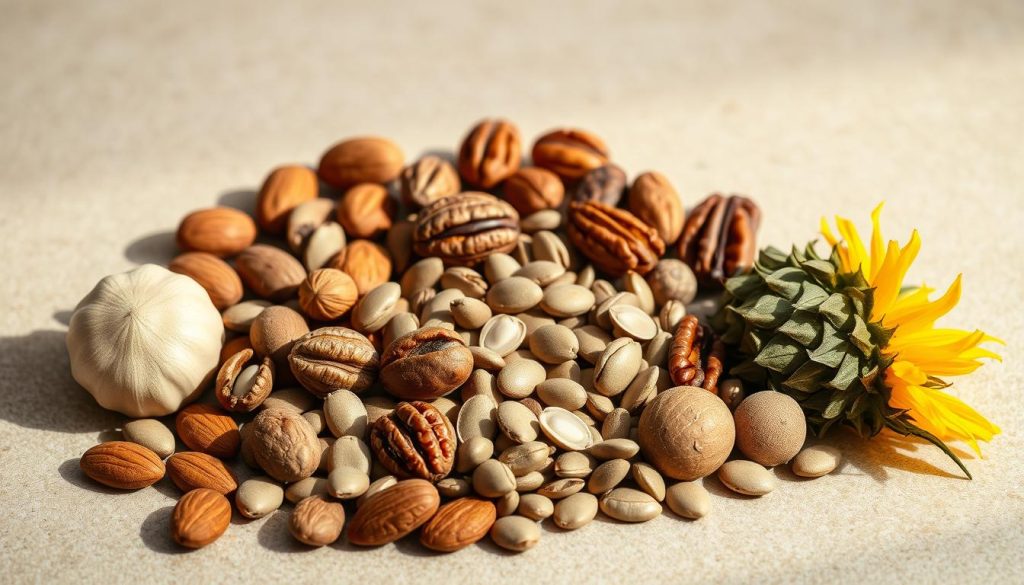
Adding nuts and seeds to your meals can boost brain health. These small foods are full of nutrients that help your brain work better. They are great for seniors looking to stay sharp.
Walnuts, Almonds, and Flaxseeds: Brain-Shaped for a Reason
Walnuts, almonds, and flaxseeds are great for your brain. Walnuts, shaped like the brain, are full of omega-3s and antioxidants. Almonds have vitamin E, and flaxseeds offer omega-3s and fiber.
These foods help your brain in many ways. For example, walnuts’ antioxidants can reduce stress in your brain, helping you think clearer.
Vitamin E, Healthy Fats, and Their Protective Effects on Neurons
Nuts and seeds are packed with vitamin E and healthy fats. These are key for keeping brain cells safe. Vitamin E fights off harmful free radicals, while healthy fats support brain cell health.
| Nut/Seed | Key Nutrient | Benefit to Brain Health |
|---|---|---|
| Walnuts | Omega-3 fatty acids | Supports brain cell structure and function |
| Almonds | Vitamin E | Protects neurons from oxidative stress |
| Flaxseeds | Omega-3s and fiber | Supports heart health and cognitive function |
Easy Ways to Add Nuts and Seeds to Your Daily Routine
It’s easy to add nuts and seeds to your diet. You can sprinkle them on oatmeal or yogurt, blend them into smoothies, or just eat them raw. Swapping out unhealthy snacks for nuts and seeds can greatly improve your nutrition and brain health.
For seniors, eating brain-boosting foods like nuts and seeds is a smart move. It helps keep their minds sharp and supports their nutrition needs.
Whole Grains: Sustained Energy for Optimal Brain Function
Whole grains are key for a brain-healthy diet. They give us lasting energy and help our brains work best. Unlike refined grains, whole grains have bran, germ, and endosperm. This mix offers fiber, vitamins, minerals, and antioxidants.
These nutrients are vital for a healthy brain. They also boost our overall well-being.
The Benefits of Oats, Brown Rice, and Quinoa for Cognitive Health
Oats, brown rice, and quinoa are great for brain health. Oats have beta-glucan fiber, which helps lower cholesterol and supports heart health. This indirectly benefits our brains.
Brown rice is full of manganese, a mineral that aids enzyme function and antioxidant defenses. Quinoa is a “superfood” because it’s a complete protein. It has all nine essential amino acids needed for brain function and health.
Oats: Rich in beta-glucan fiber, which supports heart health and indirectly benefits brain function.
Brown Rice: Good source of manganese, supporting enzyme function and antioxidant defenses.
Quinoa: Complete protein with all nine essential amino acids, critical for brain function and overall health.
Blood Sugar Stability and Its Impact on Memory and Focus
Keeping blood sugar stable is key for memory and focus. Whole grains are digested slowly because of their high fiber. This prevents sudden blood sugar spikes.
This slow digestion keeps energy levels steady. It supports sustained mental performance.
Simple Whole Grain Swaps and Senior-Friendly Recipes
Adding whole grains to your diet is easy and tasty. Start by making small swaps, like choosing whole-grain bread or brown rice. For seniors, try oatmeal with fruits and nuts or quinoa salad with vegetables. These are nutritious and simple to make.
| Whole Grain | Simple Swap | Senior-Friendly Recipe |
|---|---|---|
| Oats | Oatmeal instead of instant oats | Oatmeal with banana and almond butter |
| Brown Rice | Brown rice instead of white rice | Quinoa and vegetable stir-fry |
| Quinoa | Quinoa instead of couscous | Quinoa salad with roasted vegetables |
Turmeric and Other Brain-Boosting Spices
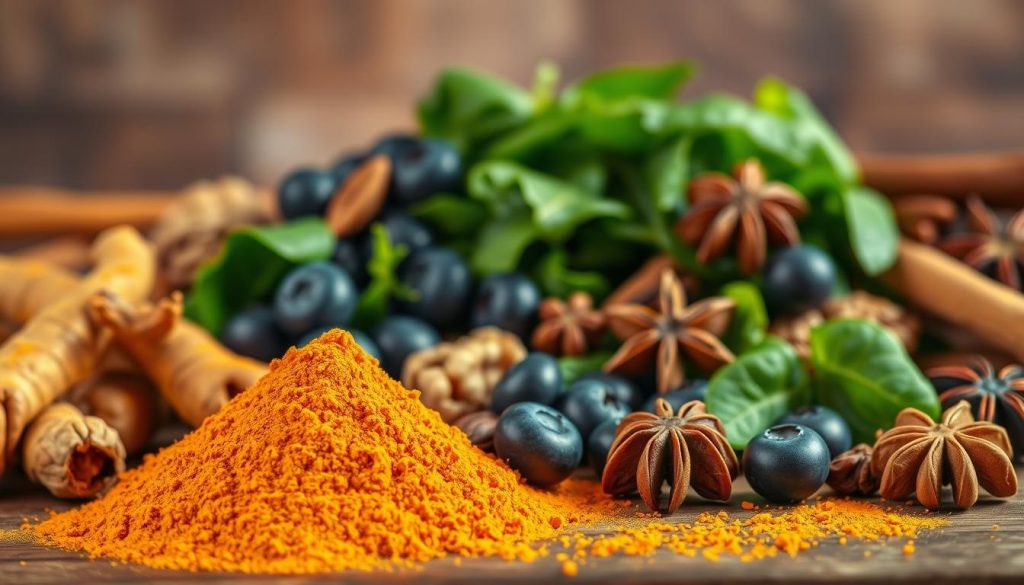
Certain spices are great for brain health, with turmeric being the top choice. Adding these spices to your meals can make your food taste better. It also helps your brain work better as part of a brain health diet.
Curcumin’s Remarkable Impact on Brain Health and Memory
Turmeric has a special compound called curcumin. It’s known for its strong anti-inflammatory and antioxidant effects. Curcumin can even get into the brain, helping to remove harmful plaques linked to Alzheimer’s. This makes it a top choice for improving mental clarity.
Research shows that curcumin can boost memory and brain function. This is true for both healthy people and those with brain diseases.
Other Beneficial Spices: Cinnamon, Sage, and Rosemary
Other spices also support brain health. Cinnamon helps control blood sugar, which is key for brain function. Sage can improve memory, and rosemary boosts brain performance.
Practical Ways to Incorporate These Spices Into Everyday Meals
It’s easy to add these spices to your diet. Mix turmeric into oatmeal or scrambled eggs. Sprinkle cinnamon on toast or in coffee. Add fresh rosemary to roasted veggies or sage to stuffing.
By making these small changes, you can improve your brain health. This supports mental clarity and contributes to a better brain health diet.
Conclusion: Nourishing Your Brain for a Vibrant, Independent Future
As we age, our brains change, which can impact how we think and act. Eating a balanced diet full of important nutrients helps keep our brains healthy. Foods like fatty fish, colorful berries, and leafy greens are great for seniors.
Adding these foods to your meals is easy and tasty. By choosing the right foods, you can help your brain stay sharp and keep your independence. It’s key to focus on eating well for your brain’s health.
By eating right, you can help your brain stay strong. Start with small changes in your diet. Look for new recipes to keep your meals exciting and varied.

